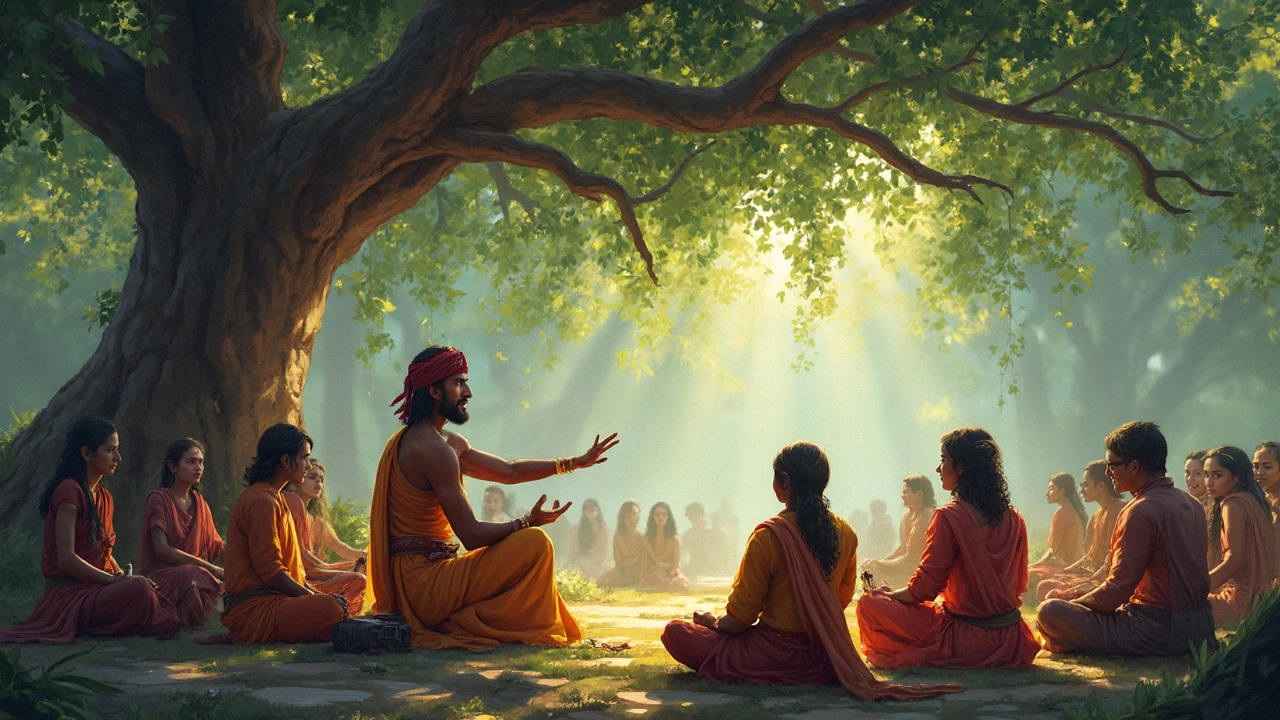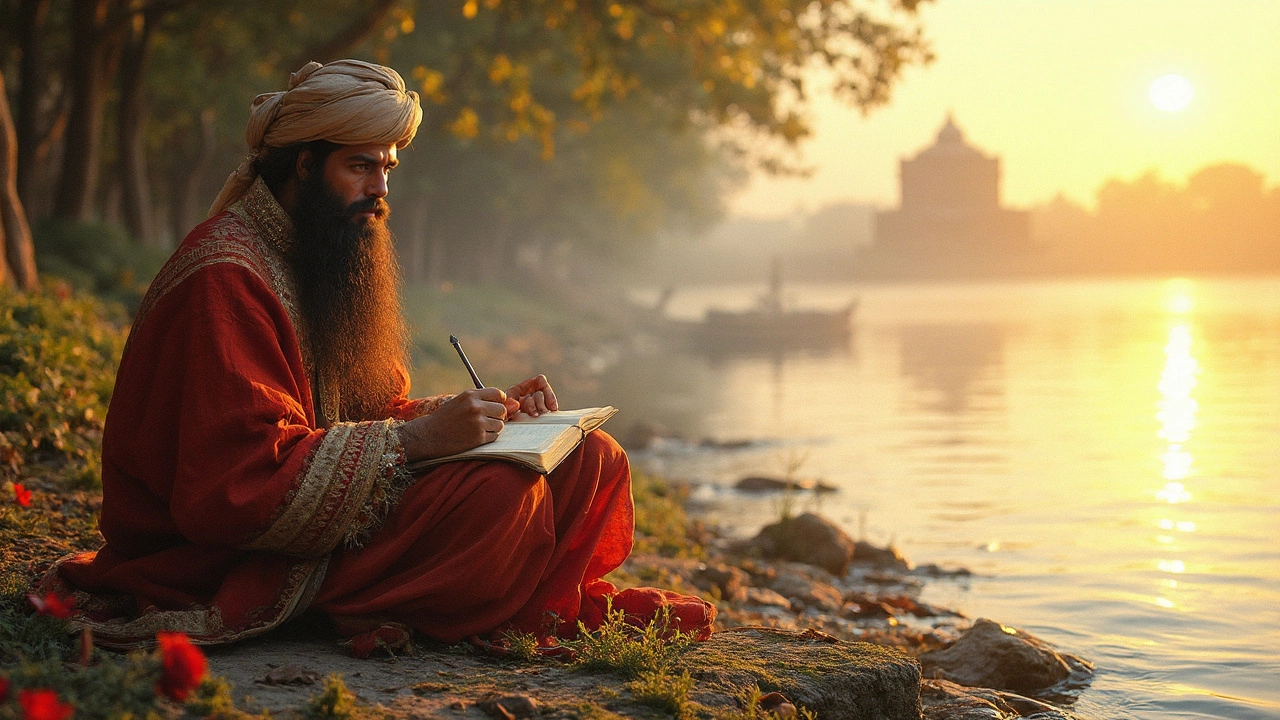
Indian poetry is nothing short of a treasure chest, brimming with history, emotion, and cultural heritage. What are Indian poems called? Well, the answer isn't just a word or two. Indian poems come in diverse forms and styles, reflecting the myriad languages and cultures across the country. Each type of poem carries its own unique flavor, from epic tales to romantic couplets.
Let's kick things off with the epic tradition. Ancient Indian epics like the Mahabharata and Ramayana are monumental, not just in their size but in their impact. They’re written in Sanskrit, and they're filled with tales that are as much about moral dilemmas and divine adventures as they are about poetry. These texts have been influencing not just poets, but all kinds of artists for centuries.
- A Glimpse of Indian Poetry
- Ancient Epics and Texts
- Diverse Regional Styles
- Famous Indian Poets
- Impact on Modern Poetry
A Glimpse of Indian Poetry
India's poetry scene is as vibrant and diverse as the country itself. With thousands of years of history behind it, Indian poems encapsulate everything from the spiritual to the everyday. These poems are not just art but cultural snapshots, providing insight into different historical eras and societal values.
Indian poems often vary regionally, akin to regional cuisines. They can be as different as rasam from vindaloo. In the north, Urdu shayari adds an exquisite touch of romance and existential musings, dancing lightly over the heavy Mughal history it often carries with it. In the south, Tamil Sangam poetry dives deep into human emotions and nature, stemming from ancient times but resonating with timeless truths.
The Tradition of Performance
In many parts of India, poetry isn't confined to books. It's performed, sung, and enacted. Consider Bharatanatyam, a classical dance form from Tamil Nadu, where the dancer's expressive gestures and facial expressions are often aligned with poetic verses. This emphasizes poetry's role not just in literature, but in dance and music as well.Poetry in Everyday Life
Poetry is infused into the daily lives of Indians, whether through devotional songs, like bhajans, or motivational couplets known as dohas. These short verses are compact and profound, slipping wisdom into everyday conversation. It's a way of sharing knowledge and life's lessons in a memorable way.Even Bollywood, India's colossal film industry, embraces the rich history of poetry in India. Many movie scripts and songs draw inspiration from classical poems, underscoring how poetry continues to influence modern culture.
Indian poetry is more than words on a page. It's woven into the fabric of the nation, shaping and reflecting its heritage. From ancient scriptures to Bollywood hits, poetry in India continues to be a vibrant expression of human thought and emotion.
Ancient Epics and Texts
Diving into the world of Indian epics, we're talking about grand tales that aren't just stories, but life lessons wrapped in verses. The Mahabharata and Ramayana are the trailblazers here. These epic poems aren't merely for reading – they're meant to be experienced.
The Mahabharata
First off, the Mahabharata is a monster of a poem. Clocking in at over 100,000 verses, it's one of the longest epic poems you’ll ever come across. Written in Sanskrit, it’s got everything from war strategies to philosophy, especially in the famous Bhagavad Gita segment. Imagine a story that dwells not just on adventures but also dips into existential questions. That's what makes it fascinating and relatable even today.
Ramayana
Then there's the Ramayana, penned by the sage Valmiki. While it’s shorter than the Mahabharata, what it lacks in length, it makes up for in heart. It tells the tale of Prince Rama and his journey to rescue his wife Sita. Not too different from your modern epic, right? This story is packed with courage, loyalty, and duty. It's a classic good-against-evil tale that still resonates worldwide.
Both of these epics are rich in Indian literature and give us a peek into ancient Indian society, values, and beliefs. They act like cultural blueprints that have influenced countless pieces of poetry and art not just in India, but across different cultures.
If you're into numbers, here's a fun stat: the Mahabharata takes about 150 hours to read if you go at a pace of 50 verses per hour! Now that's an epic reading session.

Diverse Regional Styles
India is a mosaic of cultures, and its poetry reflects this diversity beautifully. Each region, with its own language and culture, has developed a distinct style of poetry. Let's take a little tour across India to see the variety on offer in Indian poems.
North Indian Poetry
The north of India is rich with Hindi, Urdu, and Punjabi poetry. The poetry India is known for includes Hindi Kavi Sammelan poems, which are often recited at gatherings. Urdu shayari, famous for its profound emotions and romantic themes, has a huge following not just in India but worldwide.
South Indian Poems
Move down south, and you enter a world of Dravidian languages—Tamil, Telugu, Kannada, and Malayalam. Tamil Sangam poetry is ancient and was written over 2,000 years ago. It's known for its love and nature themes. Kannada poets have given us Vachana poetry, which revolves around devotion and philosophy.
Eastern and Western Traditions
Bengali poetry is celebrated for its lyrical beauty, with poets like Rabindranath Tagore shaping modern literature. In the west, Marathi poets have made significant contributions, especially during the Bhakti movement, which focused on devotion and spirituality.
Here's a snapshot of languages and poetry styles across the regions:
| Region | Significant Language | Famous Poetry Style |
|---|---|---|
| North | Hindi, Urdu, Punjabi | Kavi Sammelan, Shayari |
| South | Tamil, Telugu, Kannada | Sangam, Vachana |
| East | Bengali | Tagore's Romantic Poetry |
| West | Marathi | Bhakti Poetry |
Diverse regional styles aren't just about different languages; they mirror varied traditions, customs, and viewpoints. This variety is what makes Indian literature so fascinating for readers and scholars worldwide. So, whenever you explore Indian poetry, remember you're stepping into a world rich with different stories and narratives that reflect the heart of India.
Famous Indian Poets
India has been home to some of the most remarkable poets whose works have touched the hearts of millions. These poets have played a crucial role in shaping the rich landscape of Indian literature and poetry, each bringing something unique to the table.
Rabindranath Tagore
First up, Rabindranath Tagore. He's not just a household name in India but one of the few names echoing in the halls of global literature. Tagore was more than just a poet; he was a true polymath. Being the first non-European to win the Nobel Prize in Literature in 1913 for his collection 'Gitanjali,' Tagore's work reflects profound thoughts and elegant simplicity. His poems often delve into themes of humanity, love, and nature.
Mirza Ghalib
Then there's Mirza Ghalib, the legendary Urdu and Persian poet whose works still evoke deep emotion. Known for his ghazals, Ghalib's poetry beautifully captures the complexities of love and life's philosophical quandaries. Written in the 19th century, his poetry remains deeply relevant, constantly revived and celebrated in Indian music and films.
Sarojini Naidu
Sarojini Naidu, known as the 'Nightingale of India,' was both a freedom fighter and a celebrated poet. Her work mainly features themes of patriotism and romance. Poems like 'In the Bazaars of Hyderabad' capture vivid imagery and distinct Indian flavors, showcasing her incredible command over the English language while deeply rooted in Indian ethos.
Subramania Bharati
Subramania Bharati, or 'Bharathiyar,' was not just a poet but a revolutionary figure from Tamil Nadu. A fiery advocate for social change, his works are imbued with themes of freedom, progress, and equality. His robust, optimistic writing inspires many across India, as they strongly resonate with patriotic sentiments.
India’s poetry scene is not just about the past, though. Modern poets continue to push boundaries, creating works that challenge and inspire. These iconic names are a testament to India’s vibrant and enduring poetic tradition.

Impact on Modern Poetry
Indian poetry has made its mark far and wide, shaping the art of verse in modern times. With its roots stretching deep into the past, Indian poems continue to influence contemporary poets around the globe. Whether it's the resonance of a Sanskrit verse or the lyrical flourish of a medieval Hindi poem, their echoes can be found in today’s modern expressions.
One of the most striking influences of Indian poetry is seen in its ability to blend traditional themes with modern sensibilities. This fusion creates a vibrant tapestry that speaks to both the heart and mind. Indian literature not only celebrates age-old stories but also tackles current issues, bringing a fresh perspective to the poetic world.
Influence Beyond Borders
It's fascinating to see how Indian poetry has transcended its origins, inspiring poets worldwide. The Nobel laureate, Rabindranath Tagore, is a prime example. His work didn't just capture the essence of Indian heritage; it resonated with universal emotions. Tagore's influence is a testament to the power of Indian poems. In a nod to his enduring legacy, renowned American poet Allen Ginsberg once said:
"Tagore's music of the universe brought an undying void of feeling, painting colors not yet seen."
This quote reflects how poetry India continues to inspire a new generation, breaking cultural and language barriers.
The Digital Era
The digital age has further amplified the reach of Indian poetry. With blogs, social media, and online publications, poets have more platforms than ever to share their works. This accessibility allows the rich tradition of Indian poetry to influence modern writing everywhere.
Notable Modern Poets
- Arundhathi Subramaniam: Known for balancing tradition and modernity.
- Ranjit Hoskote: His work often merges past and present, offering deep insights.
- Vikram Seth: A master at weaving narratives with poetic grace.
These poets, along with many others, carry the torch of traditional Indian poetry into the modern realm, ensuring it remains a thriving part of global literature. The combination of historical depth and contemporary relevance makes Indian poems indispensable in the evolving world of modern poetry.